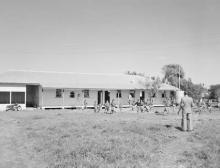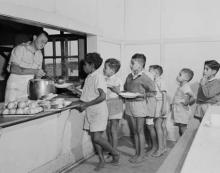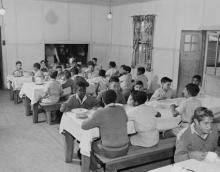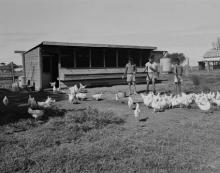Kinchela
http://www.kinchelaboyshome.org.au/
-30.975041, 152.978292Aboriginal and Torres Strait Islander boys between the ages of 5 and 15 were forcibly removed from their families and taken to Kinchela. The main purpose of Kinchela was segregation. The boys were banned from using their traditional languages. Even when attending a local fair, they were not allowed to speak to other Aboriginal and Torres Strait Islander peoples. The local community also successfully petitioned to prevent the boys from attending the local school. Kinchela's staff were untrained, and experiences of physical and sexualised violence are well documented. After its closure, the land passed into Indigenous ownership. In 2002, and despite the difficult and traumatic memories connected to the home, a reunion was held for former residents. Many of them described the loneliness, fear, physical hardship and abuse they suffered at Kinchela .
0Established in 1923 by the Aborigines Protection Board, closed in 1970.
Kinchela Boys' HomeOffice of Environment & Heritage, Government of New South Wales, Kinchel Aboriginal Boys' Training Home http://www.environment.nsw.gov.au/heritageapp/ViewHeritageItemDetails.aspx?ID=5054659
NSWWurundjeri Council
http://wurundjeri.com.au
City of Yarra, Wurundjeri History of Yarra - Introduction, City of Yarra
http://aboriginalhistoryofyarra.com.au/1-introduction/
We didn't have a clue where we came from. We thought the Sisters were our parents. They didn't tell anybody - any of the kids - where they came from. Babies were coming in nearly every day. Some kids came in at two, three, four days old - not months - but days. They were just placed in the home and it was run by Christian women and all the kids thought it was one big family. We didn't know what it meant by 'parents' cause we didn't have parents and we thought those women were our mothers.
I was definitely not told that I was Aboriginal. What the Sisters told us was that we had to be white. It was drummed into our heads that we were white. It didn't matter what shade you were. We thought we were white. They said you can't talk to any of them coloured people because you're white.
I can't remember anyone from the welfare coming there. If they did I can't remember ... We hardly saw any visitors whatsoever. None of the other kids had visits from their parents. No visits from family. The worst part is, we didn't know we had a family.
When you got to a certain age - like I got to 10 years old ... they just told us we were going on a train trip ... We all lined up with our little ports [school cases] with a bible inside. That's all that was in the ports, see. We really treasured that - we thought it was a good thing that we had something ... the old man from La Perouse took us from Sydney - well actually from Bomaderry to Kinchela Boys' Home. That's when our problems really started - you know!
This is where we learned that we weren't white. First of all they took you in through these iron gates and took our little ports [suitcases] off us. Stick it in the fire with your little bible inside. They took us around to a room and shaved our hair off ... They gave you your clothes and stamped a number on them ... They never called you by your name; they called you by your number. That number was stamped on everything.
If we answered an attendant back we were 'sent up the line'. Now I don't know if you can imagine, 79 boys punching the hell out of you - just knuckling you. Even your brother, your cousin. They had to - if they didn't do it, they were sent up the line. When the boys who had broken ribs or broken noses - they'd have to pick you up and carry you right through to the last bloke. Now that didn't happen once - that happened every day. Before I went to Kinchela, they used to use the cat-o'-nine-tails on the boys instead of being sent up the line. This was in the 30s and early 40s.
Kinchela was a place where they thought you were animals. You know it was like a place where they go around and kick us like a dog ... It was just like a prison. Truthfully, there were boys having sex with boys ... But these other dirty mongrels didn't care. We had a manager who was sent to prison because he was doing it to a lot of the boys, sexual abuse. Nothing was done. There was a pommie bloke that was doing it. These attendants - if the boys told them, they wouldn't even listen. It just happened ... I don't like talking about it.
We never went into town ... the school was in the home ... all we did was work, work, work. Every six months you were dressed up. Oh mate! You were done up beautiful - white shirt. The welfare used to come up from Bridge St, the main bloke, the superintendent to check the home out - every six months.
We were prisoners from when we were born ... The girls who went to Cootamundra and the boys who went to Kinchela - we were all prisoners. Even today they have our file number so we're still prisoners you know. And we'll always be prisoners while our files are in archives (p. 143-145).
Confidential evidence 436, New South Wales. John was removed from his family as an infant in the 1940s. He spent his first years in Bomaderry Children's Home at Nowra. At 10 he was transferred to Kinchela.
Human Rights and Equal Opportunity Commission, Bringing them Home: National Inquiry into the Separation of Aboriginal and Torres Strait islander Children from Their Families (1997)
Infant Confidential evidence 436 - JohnAt the time, we used to get a lot of coke. You got to fill the coke bins up. That's what you got to kneel on - on the coke [as a punishment]. You got no long trousers, [only] shorts and bare-footed. You know what we got to eat? Straw and buns. That was our tea. That's besides getting the cane. Get straw and buns. Quite naturally you're going to pull the straw out and chuck it away. You do that and you get caned. You're supposed to eat it (p. 139).
Confidential evidence 531, New South Wales: man removed to Kinchela Boys' Home at 9 years in 1950.
Human Rights and Equal Opportunity Commission, Bringing them Home: National Inquiry into the Separation of Aboriginal and Torres Strait islander Children from Their Families (1997)
9 years Confidential evidence 531The Kinchela Boys Home Aboriginal Corporation (KBHAC) is a not-for-profit community organisation that was established in 2001. Its founders were Aboriginal and Torres Strait Islander men who, as boys and young men, were forcibly removed from their families and communities and taken to Kinchela Boys Training Home (KBH):
"The memories of the harsh treatment and cruelty that many of the men experienced while in KBH continue to haunt them. The trauma they underwent can still be felt today. Notwithstanding this pain and trauma, the KBH survivors have been undeterred in their quest for justice, acknowledgement and healing. They have maintained a strong brotherhood that developed while they were in KBH which helped them survive their time there. This brotherhood continues to provide them with strength and support today."
Kinchela Boys Home Aboriginal Corporation, About Us, Kinchela Boys Home Aboriginal Corporation
http://www.kinchelaboyshome.org.au/about-us/

Kinchela Boys' Home, 1959: Boys and a teacher

Kinchela Boys' Home, 1959: Boys queued in the cafeteria

Kinchela Boys' Home, 1959: Boys in the dining hall

Kinchela Boys' Home, 1959: Boys feeding chickens
